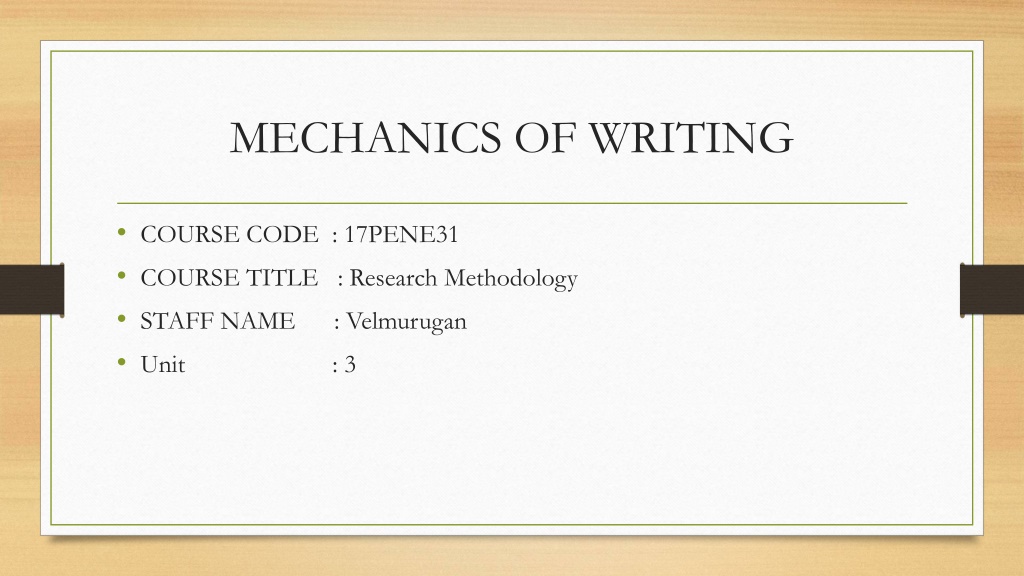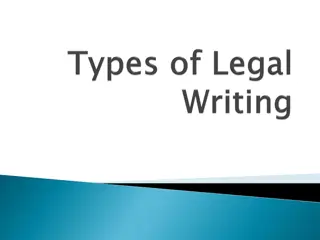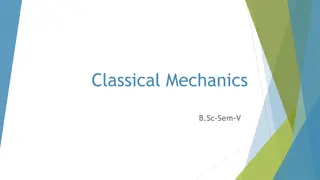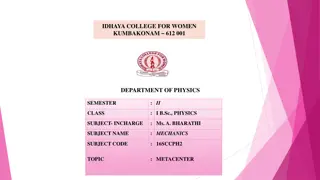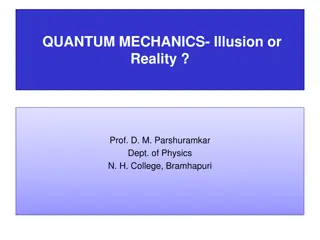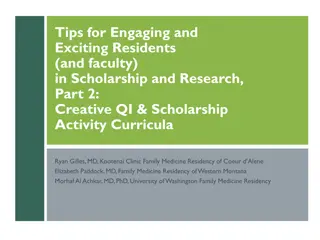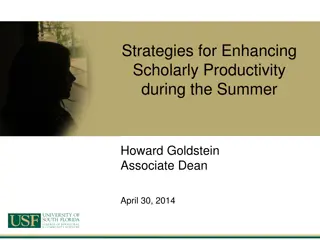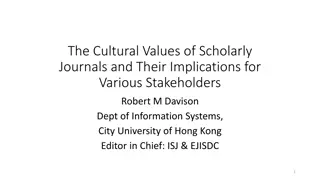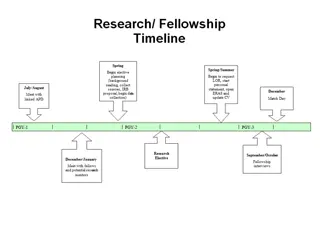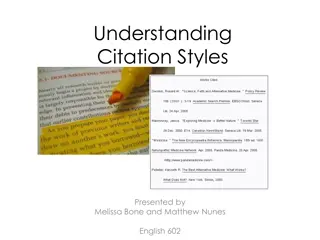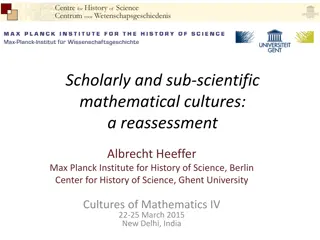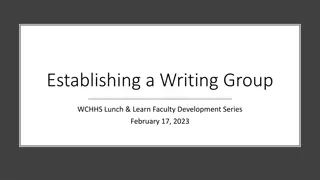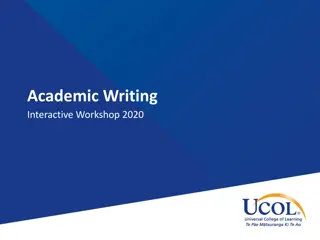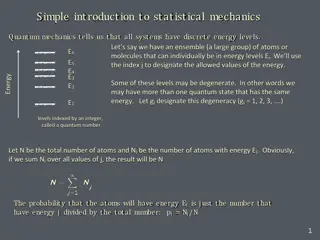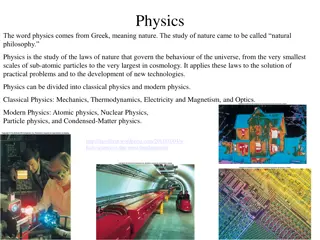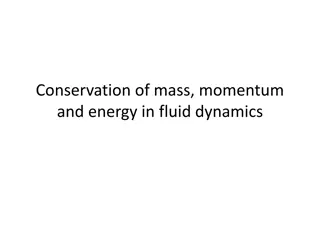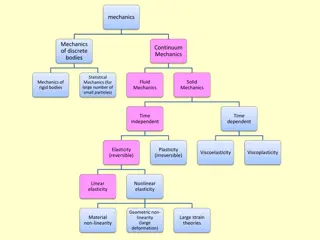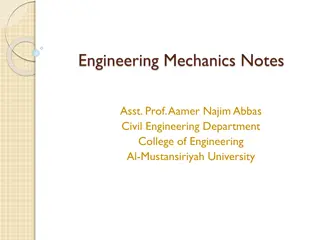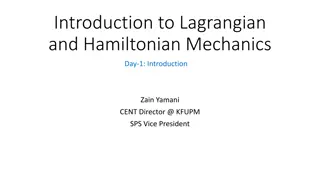Essential Components of Scholarly Writing: A Guide to Mechanics
Understanding the mechanics of writing is crucial for scholarly work. This course covers research methodology, spelling consistency, punctuation rules, word division, plurals, foreign words, and more. Learn to apply correct writing components like spelling, punctuation, italics, numbers, and capitalization. Enhance your writing skills by maintaining consistency and accuracy in all aspects of academic writing.
Uploaded on Oct 06, 2024 | 0 Views
Download Presentation

Please find below an Image/Link to download the presentation.
The content on the website is provided AS IS for your information and personal use only. It may not be sold, licensed, or shared on other websites without obtaining consent from the author. Download presentation by click this link. If you encounter any issues during the download, it is possible that the publisher has removed the file from their server.
E N D
Presentation Transcript
MECHANICS OF WRITING COURSE CODE : 17PENE31 COURSE TITLE : Research Methodology STAFF NAME : Velmurugan Unit : 3
MECHANICS OF WRITING A RESEARCH - Research Methodology
The Mechanism of writing relates with essential components of scholarly writing
Components of correct writing Spelling Punctuation Italics Numbers Name of persons Titles of works in the research paper Quotations Capitalization and personal names
Spelling CONSISTENCY paper-except in quotation, which must retain the spelling of the original ,whether correct or incorrect Word Division Spelling including hyphenation, should be consistent throughout the research Turn off te automatic hyphenation option in our word processor. dividing words at the ends of lines is unnecessary and it has disadvantages.
Plurals (lawstaxes) , with several exceptions Foreign Words The plurals of English words are formed by addition of the suffix s or es For quoting material in a foreign language , must reproduce all accents and other marks exactly as they appear in theoriginal. Eg ecole , pieta . Tete .
PUNCTUATION Puntuation clarifies sentence structure , separating some words and grouping Others It adds meaning to written words. Commas use a comma before a coordinating conjuction (and, but, for, nor or, so)joining independent clauses in sentences. E.g.- Congress passed the bill, but the president rejected it.
Punctuation Use commas to separate words, phrasesand clauses in a series. WORDS E.g.- Baccaccio s tales have inspired , plays, films, operas, and paintings. PHRASES E.g.-Alfred the great established asystem of fortified town , reorganized the military forces , and built a fleet of worships.
Semicolons Use a semicolon between independent clauses not linked by a conjuction. E.g.- The coat is tattered beyond repair; still, ajay hopes the tailor can mend it. Use semicolom between items in a series when the items contain commas. E.g.- Present at the symposium were henri guillaume , the art critic; sam brown, the daily tribune reporter; and Maria rosa, the conceptual artist.
Use a colon to introduce a quotationthat independent from the structure of the main sentence. In The Awankening, Mme Ratingnolle exorts Robert Lebrun to stop flirting with edna : She is not one of us; she is not like us . A colon is used after a verb of saying ,however , if the verb introduces certain kinds of formal literary quotations, such as long quotations set off fro, the main text.
Hyphens Dashes and parentheses Apostophes Quotation Marks Square Brackets Slashes
Italics Style of type in which characters slant to the right. Why use it?- More visually pleasing than underlining. Usage To indicate words and letters referred to as words and letters. Shaw spelled Shakespeare without the final e. The words albatross probably derives from the Spanish and Portuguese word Alcatraz.
Foreign words in an English Text nonchalance , in the face of adversity. The Renaissance courtier was expected to display sprezzatura , or Exception eg, a quotation entirely in another (Caesar said, Veni, vidi,vici . titles of works. Common latin phrases like ad hoc, etc, al are not italicized. Non English
Names of persons First and subsequent uses of names the first instance should be the name in full without any change from the source. Subsequent instances can be shortenedto the last name only. In casual references /references to very famous people,the first name can beused in isolation eg Shakespeare, Mozarti.
Tiltle of persons Do not use formal titles (Mr, Mrs , Ms, Dr., Prof.) Names of authors and fictional characters simplified names permitted(vergil for publius vergilius maro) Pseudonyms are acceptable Fictional characters referred to in the same way as they appear in the work Dr. Jekyll .
Numbers The convention is to use only Arabic numerals. Roman numbers are not used. Spell out if numbers are used infrequently otherwise use numerals.Eg: In the ten years coveredby the study , the number of participating institutions in the United states doubled , reaching 90, and membership in the six-state region rose from 4 to 15. For dates , use either the day month-year style (22 july 2008) or the month-day-year style (july 22,2008).
Titles of works in the research paper Capitalization and punctuation Always take the title from the title page,not the cover or inner pages. Omit special typographic characteristics. Capitalize the first word , last word andall principal words. Tiles of works must be italicized larger works, websites, lectures, unpublished works etc. Use quotation marks for titlesof articles , essays, stories, poems published within
Names of scriptural works,religious documents etc are not italicized. Eg Koran , Bible , Upanishads , Genesis , Gospels etc. Specific laws , acts, political documents, musical compositions, buildings and monuments , seminars, workshops , cources etc are not italicized or put within quotes.
Quotation Marks Effective when used selectively. Quote only parts that are particularly interesting, vivid, unusual or apt, keep all quotations as brief as possible. Over quotation can bore your readers and indicates lack of original thought. Accuracy of quotations in research writing is extremely important. Any changes to the original must be indicated clearly.
Quoting Prose Quoting Poetry Quoting Drama Quoting Ellipsis
